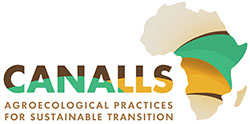In our recent 2nd round of co-creation workshops, stakeholders engaged in an in-depth exploration of agroecological practices to address the primary challenges faced in our Agricultural Living Labs (ALLs).
Key activities included mapping alternative agroecological practices to overcome the three most pressing challenges and defining combinations for field evaluation. They also identified enablers and barriers for adopting the proposed practices and strategized ways to overcome them. Additionally, discussions on the experimental phase were initiated to ensure thorough and effective implementation.
During our recent 2nd round of co-creation workshops, stakeholders delved deeply into exploring agroecological practices aimed at tackling the primary faced in our Agricultural Living Labs (ALLs). The sessions involved mapping out alternative agroecological practices to address the top three challenges, devising combinations for on-field testing. They also pinpointed factors facilitating the adoption of these practices, strategizing methods to overcome obstacles. Furthermore, discussions commenced on the experimental phase to ensure comprehensive and successful implementation.
Below are the specific challenges and the selected agroecological practices that will be evaluated in each ALL:
Kamonyi ALL
The challenges faced include soil erosion and nutrient depletion in agricultural systems. The selected practices to address these challenges in cassava cultivation are fanya-ju terraces with graces and trees/bushes in the bounds, , intercropping cassava with legumes, and using a combination of local manure, organic fertilizer produced from town residues, synthetic fertilizer, and lime.
Biega and Kabare ALLs
The challenges identified in Biega and Kabare are similar, and since they are close to each other in distance, they decided to join efforts to implement one experiment covering both areas. The primary issues are soil infertility, soil erosion, old coffee varieties and aging trees, and pests and diseases. To address these, the selected practices are the use of organic fertilizers produced from town residues, green manure cover crops, anti-erosion grass hedges, and the use of bio-pesticides.
Uvira ALL
The main challenges are diseases and pests, drought, and low soil fertility in rice and cassava cultivation. The selected practices are integrated pest management combined with biopesticides and disease-resistant seeds, Integrated Water Resource Management (IWRM), and a combination of organic and synthetic fertilizers.
Ntui ALL
In cocoa cultivation, the challenges are pest and diseases, and low soil fertility. The selected practices to address these issues are foliar fertilizer, improved shade management, and the use of biopesticides to reduce insect/mirid incidence.
Bujumbura ALL
Challenges in maize cultivation include low soil fertility, pests and diseases, and limited access to quality seeds. The selected practices are the use of a combination of compost and sanitized human urine and botanical biopesticides.
These selected practices aim to enhance sustainability and productivity, addressing specific regional challenges through agroecological solutions.



